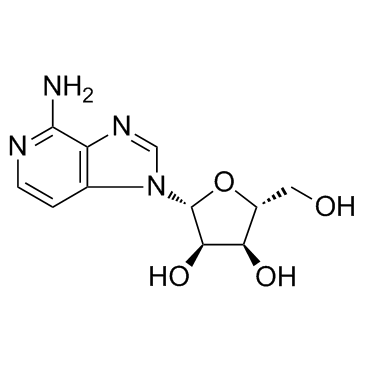The S-adenosyl homocysteine hydrolase inhibitor 3-deaza-adenosine prevents oxidative damage and cognitive impairment following folate and vitamin E deprivation in a murine model of age-related, oxidative stress-induced neurodegeneration.
Thomas B Shea, David Ashline, Daniela Ortiz, Shelia Milhalik, Eugene Rogers
文献索引:Neuromolecular Med. 5(2) , 171-80, (2004)
全文:HTML全文
摘要
Deficiencies in folate promote neurodegeneration and potentiate the influence of other risk factors for neurodegeneration. This is accomplished at least in part by increasing levels of the neurotoxin homocysteine (HC). The S-adenosyl homocysteine (SAH) hydrolase inhibitor 3-deaza-adenosine (DZA) prevents HC accumulation following folate deprivation. We tested the ability of dietary supplementation with DZA to counteract the deleterious influence of folate deprivation. Folate deficiency has previously been shown to potentiate the impact of apolipoprotein E (ApoE); ApoE-/- mice deprived of folate demonstrated increased oxidative damage in brain tissue and impaired cognitive performance as compared to normal mice or to ApoE-/- mice receiving folate. Herein, we demonstrate that dietary supplementation with DZA prevented both the increase in oxidative damage and impaired cognition characteristic of ApoE-/- mice following folate deprivation. These findings suggest that manipulation of the methionine cycle by DZA can counteract folate deficiency. Because folate deprivation, increased HC, and apolipoprotein E deficiency are all risk factors for Alzheimer's disease, these findings also underscore that DZA might be useful in a therapeutic approach to delay neurodegeneration in Alzheimer's disease.
相关化合物
| 结构式 | 名称/CAS号 | 分子式 | 全部文献 |
|---|---|---|---|
 |
3-Deaza-腺苷
CAS:6736-58-9 |
C11H14N4O4 |
|
Disruption of choline methyl group donation for phosphatidyl...
2002-05-10 [J. Biol. Chem. 277(19) , 17217-25, (2002)] |
|
Activation of caspase-8 in 3-deazaadenosine-induced apoptosi...
2001-12-31 [Exp. Mol. Med. 33(4) , 284-92, (2001)] |
|
Identification of A-minor tertiary interactions within a bac...
2002-08-20 [Biochemistry 41(33) , 10426-38, (2002)] |
|
Dietary supplementation with 3-deaza adenosine, N-acetyl cys...
2004-01-01 [Neuromolecular Med. 6(2-3) , 93-103, (2004)] |
|
3-Deazaadenosine inhibits vasa vasorum neovascularization in...
2009-01-01 [Atherosclerosis 202(1) , 103-10, (2009)] |